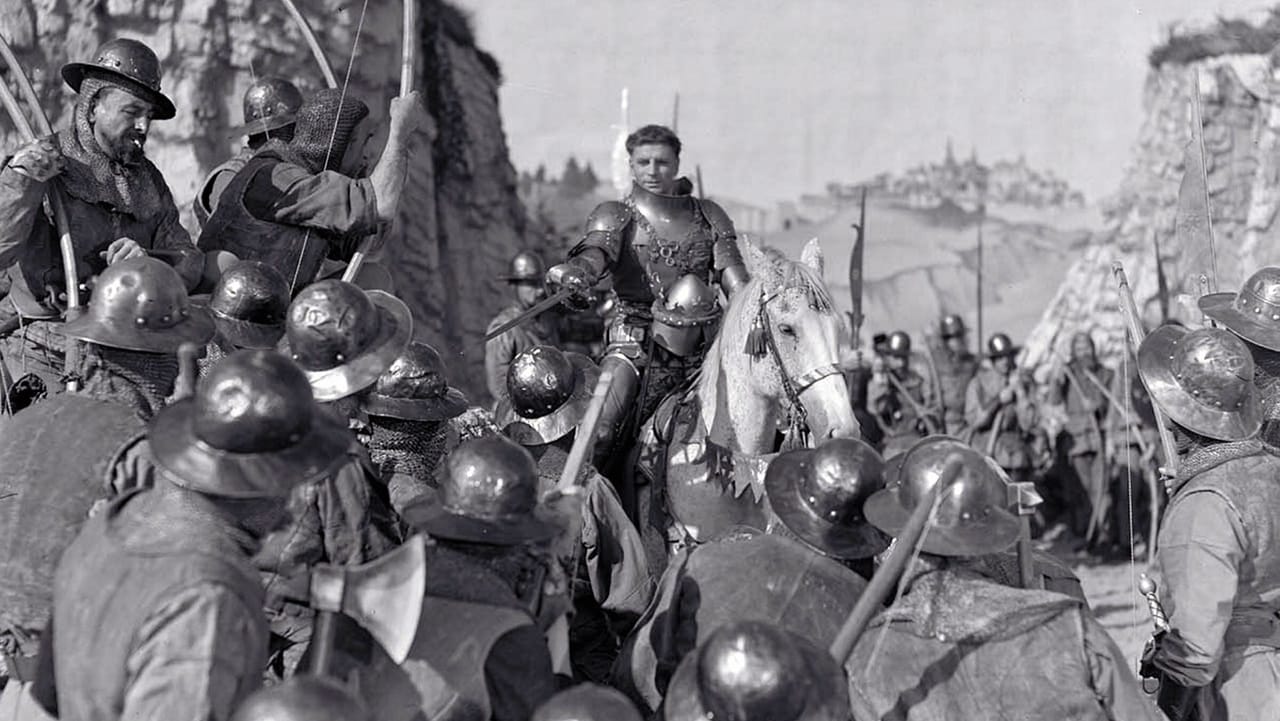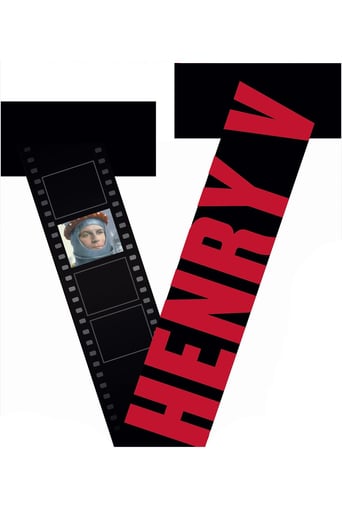

The Worst Film Ever
... View MoreA movie that not only functions as a solid scarefest but a razor-sharp satire.
... View MoreIt’s fine. It's literally the definition of a fine movie. You’ve seen it before, you know every beat and outcome before the characters even do. Only question is how much escapism you’re looking for.
... View MoreWhile it is a pity that the story wasn't told with more visual finesse, this is trivial compared to our real-world problems. It takes a good movie to put that into perspective.
... View MoreThis is an awful movie, really just awful. No one who has seen Kenneth Branagh's masterful Henry V (1988) can watch this turkey without cringing. For starters, the characters of Canterbury and Ely are such bumbling fools that they completely eviscerate Henry's reliance on churchly assurances that the war is just. At Harfleur, the film omits Henry's frightening "shrill-shrieking maidens, naked infants spitted upon pikes" speech. It also omits Henry's confrontation with Masham, Scroop and Gray (which Branagh does brilliantly), and turns Henry's court into a parade of fops. The French king is a weak-minded fool, and the soldiers appear to have been taken directly from a Laurel and Hardy movie. Really, it's awful. Yes, it was a propaganda film for the Brits in 1944, but still -- if you want the real Henry, bypass this and go for Branagh's masterpiece.
... View MoreThis was commissioned by Churchill to help rally the Allied troops for the invasion or liberation of Nazi-occupied France in 1944. After all, Shakespeare's play deals with the Plantagenet king's success in sailing for France and defeating their forces at Azincourt against all the odds.It's odd to watch this, as it's a history lesson in triplicate. First there's the fact it's a sort of propaganda piece. Then it's of the Shakespearian era, as the stunning opening shot in technicolour is a sweeping view up the Thames of Elizabethan London, from the Tower of London to the Globe Theatre. The conceit is that the play is being staged during the time it was written, and Olivier et al are Shaky's contemporaries. But of course, the events of the play took place some 180 years earlier, in 1415.I admit I could only follow this with my No Fear Shakespeare guide providing a translation! But I had to turn several pages at a time to keep up, as large chunks are omitted from this version. Usually anything that hints of discord in the British camp, this being a propaganda piece of sorts. So the barons' plot to topple the king on the eve of his departure for France is omitted - though the barons do appear, just without Henry V's Blofeldesque pay off. Also, Henry's talk of ensuring Scotland is subdued as they always used war with France to invade through the backdoor. Not wise talk in 1944 when you want the whole of the UK to rally behind you! Also, some historical references: that the King is descended from the French himself, or his remorse expressed over his father Henry IV's actions. (Henry IV aka Richard Bollingbrook was a baron who overthrew Richard II, arguably the last medieval king, and had him starved to death in the tower, casting doubt on Henry V's legitimacy, which he helped assuage by having Richard disinterred and reburried in Westminster Abbey, the proper place for kings.) They also omit Henry's 'let us in peaceably or I can't be help responsible for my soldiers raping your women' speech to Harfleur, their first port of call on arriving in France.Anyway, just shy of the half hour mark the play opens up away from the Globe and becomes a real film, albeit with cardboard backdrops etc, and Olivier looks more like the real king.The best bit is the eve of battle. In the night, the two camps face opposite each other, readying for the next day. The atmosphere as the king walks among his people by night, eavesdropping on their fears and prayers, is wonderful (look out for a very young George Cole - St Trinian's, Minder - as a young lad of the Skins age group!) and quite affecting.That said, the battle itself is a letdown in a way. Oh, it's a sunny English summer's day but the real Agincourt took place in October in northern France and was a nasty, bloody, claustrophobic affair. It had rained and the French cavalry charged, getting massacred by the English longbows (nasty, effective weapons, not the Robin Hood bows and arrows depicted here). They fell in the mud and were unable to rouse thanks to the heavy armour, they were sitting ducks. The reason only around 8,000 English, worn out by their travels and dysentry, could defeat 30,000 French (see Wiki for details) was because the French were rubbish and lambs to the slaughter.This is glossed over a bit in the film, which seems to be a jolly canter about in the English Kent countryside! Almost like a boy scout's war game activity! There's also a fabricated section (not in the play I believe) when Henry personally intervenes to avenge a death, in modern Hollywood 'I'm mad as hell' style. Excised, understandably, is the 'war crime' in which he executes the French prisoners when the enemy begins to rally.All in all a highly enjoyable movie in glorious technicolour, but I will see Branagh's version, to balance it out. And also Luc Brssson's Joan of Arc, as let us not forget that Henry V's achievements were wiped out within only 20 years, so it wasn't an enduring victory, unlike those of, say, Alfred the Great. Or Churchill, of course.
... View MoreThe term that comes to me most easily when describing Laurence Olivier is 'beautiful'; he is unquestionably beautifully-made both in feature and in body, and his voice is an instrument of controlled and flexible beauty, coupled to a face capable of eloquent and delicate precision -- to the degree that I could easily award him my favourite accolade and say in this respect that he could have been a silent actor. In fact, the technique in his Shakespearian films that I have most actively admired is that of the soliloquy in voice-over: sounds and thoughts alike at their most expressive, without the distracting mechanics of their production.And yet... and yet there is, so often, this "and yet". Even in the screen performances that are remarkable -- for by no means every one of them is great, or even good -- I keep finding myself watching, not the narrative, but the famous Olivier; not the character, but the proficiency of the technique. And somehow he seems to miss out on the charisma, the spark of human connection that a screen stalwart like Leo Genn can bring to a role without headline billing, only for a dawning realisation when the credits roll -- 'so that's why such a minor character stood out'... All too often in these films Olivier seems to be enacting the story opposite the other players rather than entering with them into the actual tale. It's unexpected, from one who was renowned on stage precisely for his ability to lose himself in his role."Henry V" was one of the films in this Olivier season that I found more than merely a curiosity, precisely because there are a number of sections where for me the story does take over; where King Harry becomes a character I care about rather than a piece of acting in the abstract. All the same I was unable to lose myself in it entirely: Olivier in declamatory mode ("Once more unto the breach", "St Crispin's day") is the Great Shakespearian, but not part of the film in the way of Harry moving quietly among his men at night, or charming his princess into their dynastic match in false French and broken English. Some of these more intimate scenes, however, are very good indeed. The shot that particularly stays in my mind is the wordless moment on the King's face as his soldiers speak unknowingly of the deaths that will lie at the door of their commander.Perhaps the most distinctive element of this production is the use of the Globe Theatre as a framing device, in conjunction and coupled with a quite deliberate deployment of obviously artificial scenery and perspective. From the opening diorama fading in to the 'live' theatre, the film blends three-dimensional stage sets with location shooting and flat manuscript-type illustrations, such that horsemen can leave a forced-perspective castle gate and ride up into a picture, or the camera roam seamlessly out from a painted set to a cottage yard by way of rows of vines across the page. The rationale was no doubt wartime economics, but the decision to make virtue of necessity and create a deliberately stylised look (that echoes -- yet is not the same as -- the staging at the Globe: witness the street-scene at the inn and then the 'real' version of it) is one that is more or less unique in my experience, and is an inspired choice. Instead of unconvincingly realistic scenery done on the cheap, we have an openly imaginary world conjured up as a stage performance starts to come to life. And what a performance...I first saw this film years before I ever attended London's new Globe Theatre: re-watching it now, the resonance is almost uncanny. When Olivier was filming, the Globe project wasn't so much as a gleam in Sam Wanamaker's eye -- and yet here it is, almost timber for timber as it looked and looks again today, with the same rowdy buzz, the same instrumental accompaniment, the same sellers of seats and snacks and rainwear (although nowadays it's cushions and plastic!) And when the actors step out onto the thrusting stage or the balcony at the Globe, and the groundlings stop munching their nuts and start to groan or applaud, the atmosphere is the one we see here. From thatch to tiring-chamber it works, as it did in Shakespeare's day -- speaking most literally of this cockpit, this wooden O -- and Olivier, fifty years in the past, evokes that same scene and spirit with an accuracy that delivers a shock of recognition. He couldn't possibly have known, other than theoretically: but he was right.
... View MoreLaurence Olivier made this movie during World War II. He wanted it to be a propaganda movie, and unfortunately this is still visible. His Henry is a king and war hero shining in perfect light. All the rough edges and darker points of Shakespeare's original play are left out: We don't see how Bardolph is hanged, Henry doesn't kill his French prisoners in retribution for the attack on his camp, and Pistol is actually looking forward to becoming a pimp and cut-purse in England again. All this makes the movie a bit too simple-minded and one-dimensional.But apart from that, both Olivier's acting and directing are good. Especially the opening is very innovative: It takes place in a theater, the story is presented as a real play. This gives room for comments on Elisabethean theater and interaction with the audience - look for instance how they react whenever Falstaff is mentioned. Unfortunately this angle is lost later on and the movie continues in a more conventional fashion.All in all a classic certainly worth watching, but it won't hurt to check out Kenneth Branagh's version as well for a more balanced view on the original play.
... View More